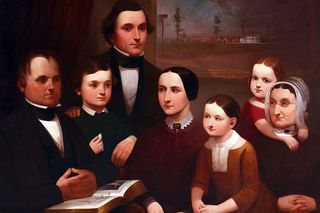
Are We Attracted to People Who Look Like Our Parents?
We look for similarities between our parents and partners because it gives us a comfortable sense of familiarity, researchers say.

Are humans attracted to people who look like their parents? If it sounds unreal and creepy, why has this been an area of interest for researchers? And is there a definitive answer to this?
Psychologist David Perrett, from Scotland-based University of St. Andrew’s, led two studies in an attempt to find out. In a 2002 study, he asked participants to rate the attractiveness of faces of different ages.
The study concluded that for women born to parents above the age of 30 years, faces that looked youthful didn’t attract them as much as those that looked mature in comparison with women born to parents under 30 years. For men, preferences for female faces were influenced by their mother’s age, especially if they were looking to be in long-term relationships.
In a follow-up study with 697 participants, Perrett found similarities existed between the hair and eye color of partners of both men, and women, with that of their parents of the opposite sex.
He explained these occurrences with two psychological phenomena. The first known as imprinting in which for us, as infants, parents are the first humans we trust. They have certain hair and facial features and therefore, we unconsciously end up preferring people with the same attributes to be more trustworthy and in essence, mate-worthy, over others.
The second possible explanation, says Perrett, lies in what is known as a mere exposure effect. The more we’re around a person, the more we tend to like them. “It’s well established that people generally respond positively to familiar stimuli and parental traits may be very salient familiar features,” he mentioned in the study. Therefore, it is likely that people end up choosing partners with familiar color traits as their parents because, at the first go, these features might appear more familiar over those whose traits don’t match.
Tamsin Saxton, senior lecturer in psychology at the Northumbria University, Newcastle, also went on to conduct an experiment to find out whether there is any connection between the quality of relationship one shares with a parent and choosing partners with facial features that resemble them.
For the same, she asked adult heterosexual women about their relationships with their parents at three different developmental stages and at the current time.
Women who retrospectively reported greater emotional support from their mother or father after menarche preferred partners whose eye color was closer to that of the parents. On the other hand, being supportive before menarche predicted greater dissimilarity between the eye color of the parents and women’s preferences for a partner.
“These results indicate a possible interplay of positive and negative sexual imprinting,” Saxton stated in the study. Negative sexual imprinting can be explained as developing a sexual aversion to others with whom one lived closely in infancy and early childhood.
The root of such preferences lies in wanting, “that comfortable feeling of familiarity, that might be enough to get a relationship underway or to maintain feelings of trust in a relationship,” Saxton wrote in The Conversation.
Related on The Swaddle:
Kids Learn How to Have Healthy Relationships From Parents
Martin Gründl, professor of consumer psychology at Harz University of Applied Sciences in Germany, and journalist Sara Goudarzi, in a piece for the Scientific American, also say familiarity does the trick. “[This might be the case only because] we might be drawn to people who have physical commonalities with us and therefore our parents,” they wrote. Explaining that we share 50% of our genetic material with our mothers and the other half with our fathers, it is a given that we will inherit many traits like hair and eye color from our parents. Therefore, this is enough to explain that we have a preference for things we are familiar with. “Faces that are similar to our own generally appear more likable, or sympathetic, to us. This does not necessarily have anything to do with a likeness to a parent,” they added.
These studies come with caveats you might want to consider. First, most of these studies are based on what participants said they would want in an ideal partner and not after they’ve actually selected partners.
In the real world, attraction, as a phenomenon, is complicated and not easy to predict. The initial similarity may play an important role when you’re attracted to somebody but does that mean it’ll last long? Ultimately, choosing a partner is not just based on how they look but also other psychological traits such as intelligence, honesty, or kindness.
These similarities along with their education level, social environment, worldview, value systems, and lifestyles also matter. So the fact that we are with a “partner who resembles us in these characteristics also tends to resemble our parents, is precisely because we ourselves have a lot in common with our mothers and fathers,” according to Gründl and Gourdazi which also helps explain how familiarity beyond just physical traits might be one of the reasons you are with or want to end up with someone similar.
And lastly, for studies concluding that attraction is based on the quality of relationship with parents, it probably matters only when it comes to heterosexual people’s preferences because parents of gays and lesbians are less likely to accept them, making it harder to confirm the point.
Anubhuti Matta is an associate editor with The Swaddle. When not at work, she's busy pursuing kathak, reading books on and by women in the Middle East or making dresses out of Indian prints.
Related


To Nap or Not to Nap? That Is the Question
